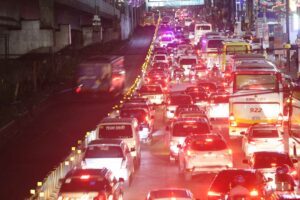By Justine Irish D. Tabile, Reporter
THE MANAGEMENT Association of the Philippines (MAP) is urging the government to appoint a “traffic czar” to address the traffic crisis in Metro Manila.
In a statement, the business group recommended a holistic plan consisting of measures aimed at decongesting Metro Manila, such as the completion of a busway system, the privatization of the Metro Rail Transit Line 3 (MRT-3) and Light Rail Transit Line 2 (LRT-2), and the transfer of all national offices to New Clark City.
“The title of having the worst traffic in the world is affirmation of a known fact that has greatly cost the economy and damaged the welfare of the people… But there is no single silver bullet to slay this traffic monster, rather a holistic approach to this crisis is essential,” the MAP said.
The business group’s statement was signed by MAP President Rene D. Almendras and MAP Transportation and Infrastructure Committee Chair Eduardo H. Yap.
The MAP said the traffic crisis is a result of failed traffic management that could be addressed through “a paradigm shift in road and traffic management policies and practices.”
“There must be a realization that high occupancy in conveyances and uninterrupted vehicle flow are the keys to higher commuter throughput,” it added.
The MAP recommended the declaration of a traffic crisis, the appointment of a new traffic management team that will be headed by a traffic czar to be appointed by the President.
According to the business group, the traffic czar would have to be given the power and authority to “mobilize, direct and deploy existing relevant resources of the government, both national and local, during the exigency of [the traffic] crisis.”
As part of its holistic plan, the MAP recommended that Metro Manila be divided into four traffic management zones to be led by zone traffic managers who will report to the traffic czar.
The group also proposed the revival of Mabuhay Lanes as alternate routes to help ease congestion along Epifanio de los Santos Avenue (EDSA), C4, C5 and other radial roads and disallow parking along these lanes during peak hours.
Traffic flows in Metro Manila should be revised by limiting left turns, crossings, U-turns and that there should be a required off-street drop-off and boarding lanes, it added.
The MAP said the government must prioritize mass public transport over private vehicles by allocating space for busways, expanding sidewalk and cycling network, lowering fares on non-peak hours, implementing road conges-tion charges on private vehicles, and instituting a one-route, one-franchise system.
At the same time, the government should privatize the EDSA Busway, MRT-3 and LRT-2 systems.
“Three years of pilot testing have proven the EDSA Busway to be the most cost-effective urban mass transit system… The Busway System must be expanded and replicated to cover other major thoroughfares, such as Common-wealth Avenue, Quezon Avenue, Sucat Avenue, Alabang-Zapote Road and others,” it said.
The MAP also recommended the development of a new government center and the transfer of all national offices to New Clark City, as well as a moratorium on building new government offices in Metro Manila.
The government must pursue the expansion of Metro Manila’s nautical highway by developing ferry systems in Pasig River and Laguna Lake and implementing roll-on, roll-off ferry systems.
The MAP also suggested the construction of more bridges over Pasig River, more on- and off-ramps in existing Skyways and alternate entry and exits for the expressways. It also proposed the construction of dedicated car park buildings with tax exemptions and other incentives.
Meanwhile, transport expert Rene D. Santiago said the MAP’s statement is a repeat of the group’s 2016 call that did not work.
Back in 2016, the MAP urged the Duterte administration to declare a traffic crisis through an executive order and appoint a traffic czar to address traffic congestion.
“It failed to get to second base then… Why would it manage to reach third base, much less first base, now, under a more deliberative regime?” Mr. Santiago said.
He noted the traffic problems in the National Capital Region have been decades in the making, so the traffic czar would need at least 10 years to resolve them.
“It would take a nonpolitical ‘Messiah’ at least 10 years to implement a methodical or step-by-step set of solutions, which would include some bitter pills that car-using MAP would oppose,” he added.
Sought for comment, Terry L. Ridon, a public analyst and convenor of think tank InfraWatch PH, said that the “traffic crisis has long set in even before the recent traffic study was released.”
“Sectors had already described a transportation crisis in the previous regime which had remained unresolved until today,” he added.
A study conducted by Japan International Cooperation Agency with the National Economic Development Authority showed that the estimated daily transport cost in Metro Manila is P3.5 billion in 2017. This was projected to in-crease to P5.9 billion a day by 2035 if nothing is done.
However, Mr. Ridon said that MAP’s call is an “indictment of the leadership of the Metro Manila Development Authority (MMDA) and the Department of Transportation (DoTr) for failing to resolve the traffic crisis almost two years into the term of President Ferdinand R. Marcos, Jr.”
He said that the President should first look into replacing the MMDA leadership “which seems to have focused too much on adding to the noise on jeepney modernization and ineffective EDSA busway solutions.”
Aside from the leadership rehaul, he said that the government should look into the implementation of a license place lottery policy which is done in Beijing, two-day number coding scheme and congestion charging.
“However, it should also roll out its plans on the new EDSA busway project, as it is already a long-delayed public private partnership project,” he added.
The MMDA and the DoTr have yet to respond to BusinessWorld’s requests for comment as of press time.
